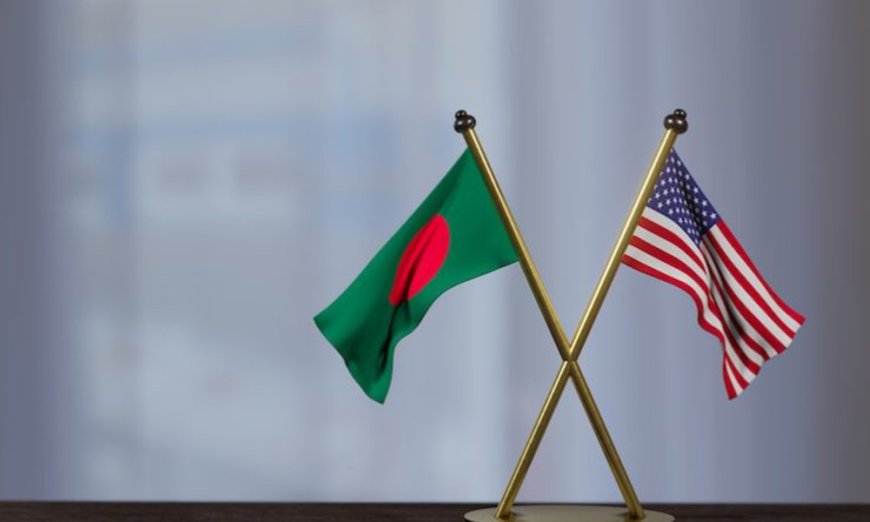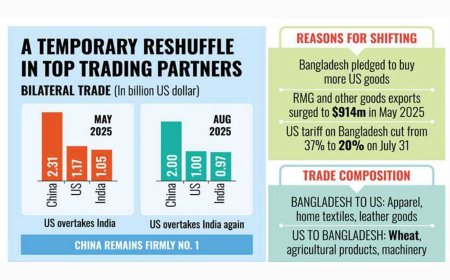Trump imposes 35% tariff on Bangladeshi goods, effective August 1
A Bangladeshi delegation is in Washington for final-round talks with the US Trade Representative's office.

Trump Imposes 35% Tariff on Bangladeshi Goods, Effective August 1
US President Donald Trump on Monday imposed a 35% tariff on Bangladeshi imports, slightly lower than the 37% he initially proposed three months ago, but still significantly higher than the 20% tariff rate granted to Vietnam—Bangladesh’s key rival in the ready-made garments (RMG) sector—under a newly concluded trade agreement with Washington.
Trump announced the long-anticipated move via his Truth Social account, posting a letter dated July 7 addressed to Bangladesh’s Chief Adviser Muhammad Yunus at 2:36am Bangladesh time on Tuesday. Similar letters, revealing country-specific tariff rates, were sent to other world leaders. All new rates are set to take effect from August 1.
According to information released Monday, Myanmar and Laos will face the highest tariffs at 40%, followed by Cambodia and Thailand at 36%, Serbia at 35%, Indonesia at 32%, and South Africa and Bosnia and Herzegovina at 30%. Imports from Japan, South Korea, Kazakhstan, Malaysia, and Tunisia will be taxed at 25%. Additional announcements are expected.
In the letter, Trump warned his counterparts against retaliatory tariff hikes, stating that any increase would be matched by a corresponding rise in US tariffs. “If for any reason you decide to raise your Tariffs, then, whatever the number you choose to raise them by, will be added onto the 35% that we charge,” he wrote to Yunus.
A Bangladeshi delegation remains in Washington for last-ditch talks with the US Trade Representative’s office, though Trump’s public declaration may leave little room for negotiation. He did, however, signal potential flexibility: “If you wish to open your heretofore closed Trading Markets to the United States, and eliminate your Tariff and Non-Tariff Policies and Trade Barriers, we will, perhaps, consider an adjustment to this letter.”
According to the Associated Press, Trump intends to continue posting these letters publicly before mailing them—marking a sharp break from traditional, closed-door diplomatic negotiations practiced by his predecessors. The tariff rates announced are unilateral decisions, not results of mutual agreements, indicating that negotiations with many countries have failed to meet US demands.
So far, the US has struck trade agreements with only the United Kingdom and Vietnam, alongside a partial deal with China. Talks with India are reportedly nearing conclusion.
Vietnam’s agreement with the US is especially significant for Bangladesh. Under the deal, Vietnam’s goods will face a 20% tariff—down from 46% initially announced, which was scheduled to take effect on July 9 after a 90-day freeze on the global “reciprocal tariffs” Trump had earlier proposed. In exchange, Vietnam agreed to remove all tariffs on US imports.
By contrast, Bangladesh currently collects nearly Tk 1,500 crore annually in import tariffs on US goods, according to official figures from FY2023–24.
Tariffs are taxes imposed on imported goods, typically paid by importers. Higher tariffs raise import costs, making foreign products less competitive in the local market. Unless US buyers absorb the higher costs, Bangladeshi RMG exporters may be forced to cut prices to remain competitive.
Before Trump’s presidency, Bangladeshi goods entering the US faced an average tariff of around 15%.
What's Your Reaction?






















































































